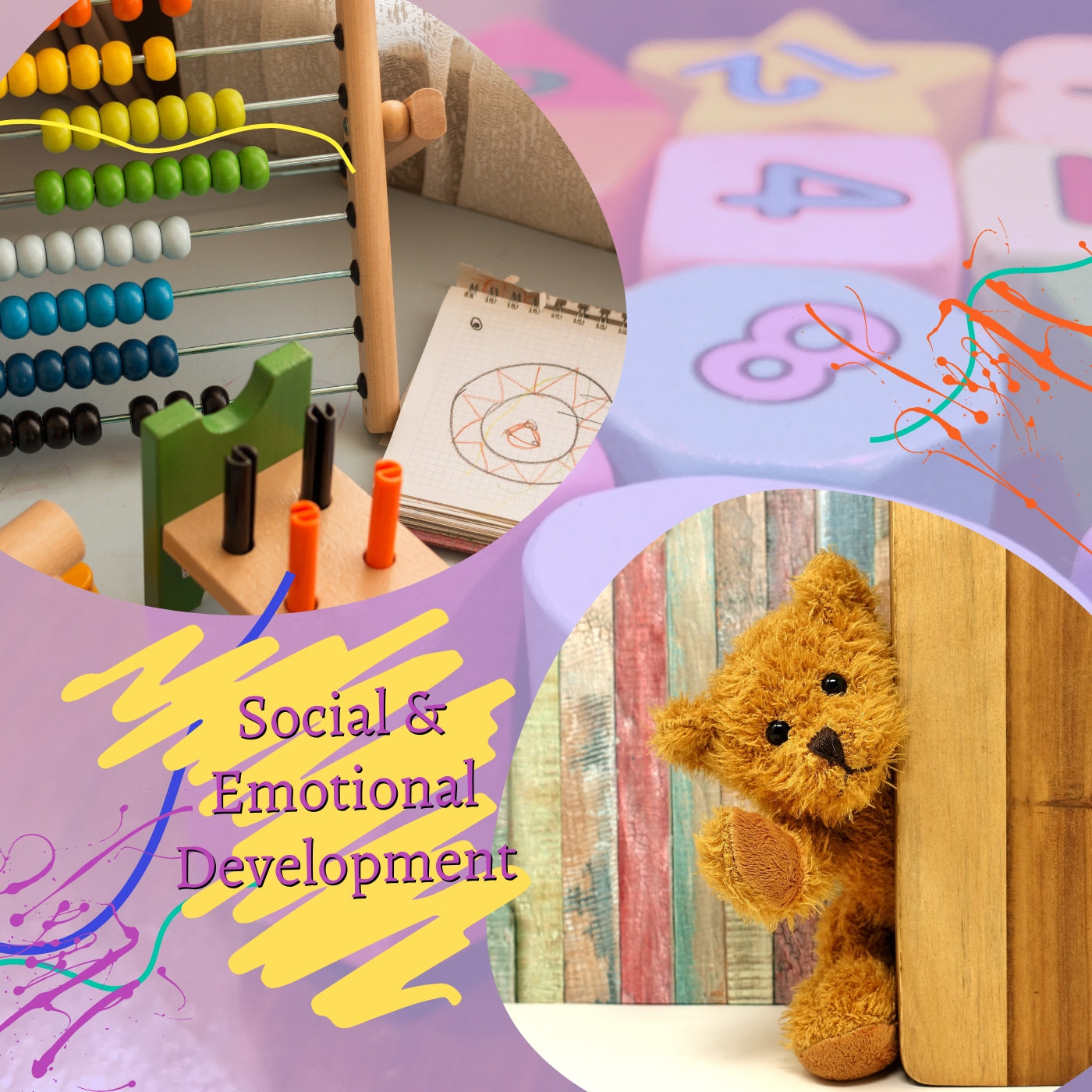
Toys are not just for entertainment; they play a significant role in a child's development. As children grow, they learn to interact and communicate with those around them, and toys can help facilitate this process. They provide a platform for children to explore their creativity, imagination, and emotions, and as such, are an essential component of their social and emotional development. In this blog post, we will delve into the importance of toys in a child's growth, the different types of toys that promote social and emotional development, and how parents can use toys to help their children learn valuable life skills. So, whether you're a parent, a caregiver, or a teacher, read on to discover how toys can help your child grow and develop into a happy, healthy, and emotionally intelligent individual.
1. Introduction: The role of play in child development
Play is an essential part of childhood, and not just because it's fun. It is through play that children learn and grow, developing crucial skills that will serve them well throughout their lives. Play helps children to develop social and emotional skills, physical abilities, and cognitive skills. It also helps them to explore and understand the world around them, developing their creativity and imagination.
Through play, children learn to interact with others, learning about social norms, and developing skills like cooperation, communication, and conflict resolution. They learn to express themselves, to identify and manage their emotions, and to empathize with others. Play also helps children to develop their physical abilities, improving their coordination, strength, and balance.
Cognitive skills are also honed through play, as children learn to problem-solve, think critically, and make decisions. They learn about cause and effect, spatial relationships, and scientific concepts like gravity and motion. Finally, play helps children to develop their creativity and imagination, as they explore new ideas, create stories, and invent games.
Through all of these activities, children grow and develop, building a foundation for their future success. Play is not just something that children do for fun %u2013 it is a vital part of their development that should be encouraged and supported by parents, caregivers, and educators everywhere.
2. What are social and emotional skills?
Social and emotional skills are the abilities that allow individuals to interact and communicate with others in a positive and healthy way. These skills include empathy, self-awareness, self-control, cooperation, problem-solving, and decision-making.
Empathy refers to the ability to understand and share the feelings of others. It is important in building relationships and forming connections with others. Self-awareness refers to the ability to recognize and understand one's own emotions, and how they may impact others. This skill is important in developing a sense of self-worth and self-esteem.
Self-control is the ability to manage one's own emotions and impulses, and to act in a way that is appropriate for the situation. Cooperation is the ability to work with others towards a common goal, while problem-solving and decision-making skills are essential for navigating the challenges and complexities of life.
Social and emotional skills are essential for healthy development, and they can be nurtured and developed through play. Toys that promote imaginative play, role-playing, and social interaction can help children develop these skills in a fun and engaging way. By providing children with the right toys and opportunities for play, we can help them grow into happy and well-adjusted adults.
3. How does play impact social and emotional development?
Play is critical for the social and emotional development of children. When children play, they learn to interact with others, understand their emotions, and develop empathy. Through play, children learn how to communicate their needs, collaborate with others, and regulate their emotions.
For example, playing with dolls or action figures allows children to act out scenarios and practice social skills. They might pretend to have conversations, share their toys, or work together to create a story. This type of play helps children develop empathy, as they learn to understand different perspectives and emotions.
Playing games with peers helps children develop important social skills such as turn-taking, sharing, and cooperation. Board games, for example, require children to wait for their turn, follow rules, and consider the feelings and needs of others.
Physical play, such as running, jumping, and climbing, helps children develop gross motor skills and body awareness. It can also help children release pent-up emotions and manage stress.
In short, play provides children with important opportunities to develop social and emotional skills that will serve them throughout their lives. Parents and caregivers should encourage and facilitate playtime as much as possible to support children's healthy development.
4. Types of toys that can promote social and emotional growth
The toys that your child plays with can have a significant impact on their social and emotional development. There are many different types of toys that can promote this growth, and it's important to have a variety available.
Firstly, imaginative play toys such as dolls, action figures, and playsets can help children develop empathy and social skills. They can practice social scenarios with their toys, which can help them learn how to navigate social situations in real life.
Building and construction toys such as blocks and puzzles can help children develop problem-solving and cognitive skills. It can also help them with communication and teamwork when building with others.
Sensory toys such as playdough, sand, and water tables can help children regulate their emotions and improve their focus. They can also help with fine motor skill development and creativity.
Games and puzzles that require turn-taking and cooperation can help children learn how to work with others towards a common goal. This can also help with communication and social skills.
Lastly, books and educational toys can promote language development, emotional regulation, and cognitive skills. Reading together can also help strengthen the parent-child bond.
It's important to have a variety of these types of toys available to your child to promote social and emotional growth. Playing with toys is not just about having fun, it's also an important aspect of childhood development.
5. How to choose toys that support social and emotional development
Choosing toys that support social and emotional development is crucial for children's growth and well-being. Here are some tips to help you choose the right toys for your child:
1. Look for toys that encourage interaction and cooperation. This could be anything from board games to building sets. These types of toys help children learn how to work together towards a common goal, cooperate, and communicate with others.
2. Choose toys that promote empathy and understanding. Dolls, stuffed animals, and action figures are great examples of toys that can help children develop empathy and understanding towards others. They can also help children learn how to express their emotions and develop their social skills.
3. Consider toys that encourage role-playing and imagination. These types of toys help children develop their creativity and problem-solving skills. They also allow children to explore different social situations and learn how to interact with others in a variety of contexts.
4. Look for toys that promote self-expression and self-awareness. Art supplies, musical instruments, and dress-up clothes are great examples of toys that allow children to express themselves and explore their own emotions and identities.
By choosing toys that support social and emotional development, you can help your child grow into a happy, healthy, and well-adjusted adult. So next time you're shopping for toys, keep these tips in mind and choose toys that will help your child develop the skills they need to thrive.
6. Play-based activities that can enhance social and emotional skills
Play-based activities are a great way to enhance social and emotional skills in children. Here are a few examples:
1. Role-playing games: Encourage children to act out different scenarios using dolls, stuffed animals, or other toys. This helps them develop their empathy and understanding of emotions.
2. Board games: Board games teach children about rules, turn-taking, and cooperation. These skills are critical for building strong relationships and understanding social cues.
3. Building toys: Legos, blocks, and other building toys inspire creativity and problem-solving skills. These activities help children learn to work together, communicate, and persevere through challenges.
4. Art projects: Art projects help children express themselves and explore their emotions. Art activities also encourage children to work independently, think critically, and collaborate with others.
5. Outdoor play: Outdoor play provides children with opportunities to explore, take risks, and build confidence. Playing outside also helps children develop their motor skills, coordination, and spatial awareness.
By incorporating these play-based activities into a child's routine, parents and caregivers can help promote social and emotional development in children. Remember, play is not just for fun, it is also an important tool for learning and growth.
7. The potential risks of overuse or misuse of technology-based toys
While technology-based toys can be engaging and educational, there are potential risks when it comes to overuse or misuse of these toys. One of the biggest risks is that children can become too dependent on screens and technology for entertainment and play. This can lead to a lack of imagination, creativity, and the ability to engage in unstructured play.
Additionally, some technology-based toys may not be age-appropriate or may contain content that is not suitable for children. It's important for parents to monitor their children's use of these toys and ensure that they are using them safely and appropriately.
Another risk of overuse or misuse of technology-based toys is that they can interfere with the development of social and emotional skills. Children need to interact with others and engage in face-to-face play to develop important social and emotional skills like empathy, communication, and problem-solving. Technology-based toys can limit the opportunities for this type of play.
To mitigate these risks, it's important to balance the use of technology-based toys with other types of play, such as physical play and imaginative play.
Parents should also choose age-appropriate toys and monitor their children's use of technology-based toys to ensure that they are being used safely and appropriately. By doing so, children can benefit from the advantages of technology-based toys while still developing important social and emotional skills.
8. The benefits of playing with others: cooperative play and social skills
Playing with others is an important part of a child's development, as it helps them learn to interact with others and develop their social skills. Cooperative play is a great way for children to learn how to work together towards a common goal, and it can help them develop important skills like communication, problem-solving, and critical thinking.
Through cooperative play, children learn how to share, take turns, and compromise, which are all important skills that they will need as they grow older. Cooperative play can take many forms, from building a tower together to playing a game of tag. Children who engage in cooperative play are often more empathetic, less aggressive, and better at resolving conflicts than those who play alone.
Playing with others also helps children develop their social skills, such as making friends, reading social cues, and understanding social norms. When children play together, they learn how to communicate effectively, how to negotiate, and how to understand different perspectives. They also learn how to manage their emotions, as they may encounter situations that are challenging or frustrating.
Overall, playing with others is an essential part of a child's development, and it can help them build important skills that will serve them well throughout their lives. So, whether it's through organized sports, playdates, or just playing with siblings or friends, it's important to encourage children to engage in cooperative play and socialize with others.
9. How to encourage children to share and take turns during playtime
Sharing and taking turns are important social skills that children need to learn from a young age. These skills will help them in their interactions with peers and adults as they grow older. However, sharing and taking turns can be difficult for children, especially when they are playing with their favorite toys. Here are a few tips to encourage children to share and take turns during playtime:
1. Model the behavior: Children learn by watching and imitating adults. If you want your child to share their toys, then you need to model this behavior yourself. Share your belongings with your child and explain why you are doing it. This will help your child understand the importance of sharing.
2. Make it fun: Children are more likely to share and take turns when they are having fun. Plan activities that require sharing and taking turns, such as playing board games or building with blocks. This will help your child understand that sharing and taking turns can be fun.
3. Set clear rules: Children need clear rules and boundaries to understand what is expected of them. Explain the rules of sharing and taking turns and be consistent in enforcing them. This will help your child understand that sharing and taking turns are important.
4. Praise good behavior: Children respond well to positive reinforcement. Praise your child when they share their toys or take turns. This will encourage them to continue exhibiting good behavior.
Overall, encouraging children to share and take turns during playtime is an important part of their social and emotional development. With patience and consistency, you can help your child develop these important skills that will serve them well throughout their lives.
10. Conclusion: The power of play to promote healthy social and emotional development in children
In conclusion, it is clear that play is a powerful tool in promoting healthy social and emotional development in children. Through play, children can learn important skills such as empathy, cooperation, and problem-solving. Toys play a vital role in facilitating this learning process as they provide a means for children to express themselves and engage with the world around them.
As parents and caregivers, it is important to recognize the value of play in promoting healthy development in children. By providing access to a variety of toys and encouraging children to play, we can help them develop important social and emotional skills that will serve them well throughout their lives.
In today's fast-paced world, it can be easy to overlook the importance of play and prioritize academic achievement or structured activities. However, it is important to remember that play is not just a fun distraction, but a crucial component of healthy development. So next time you see your child playing with their favorite toy, remember the important role it is playing in their growth and development.

